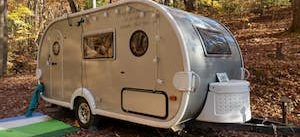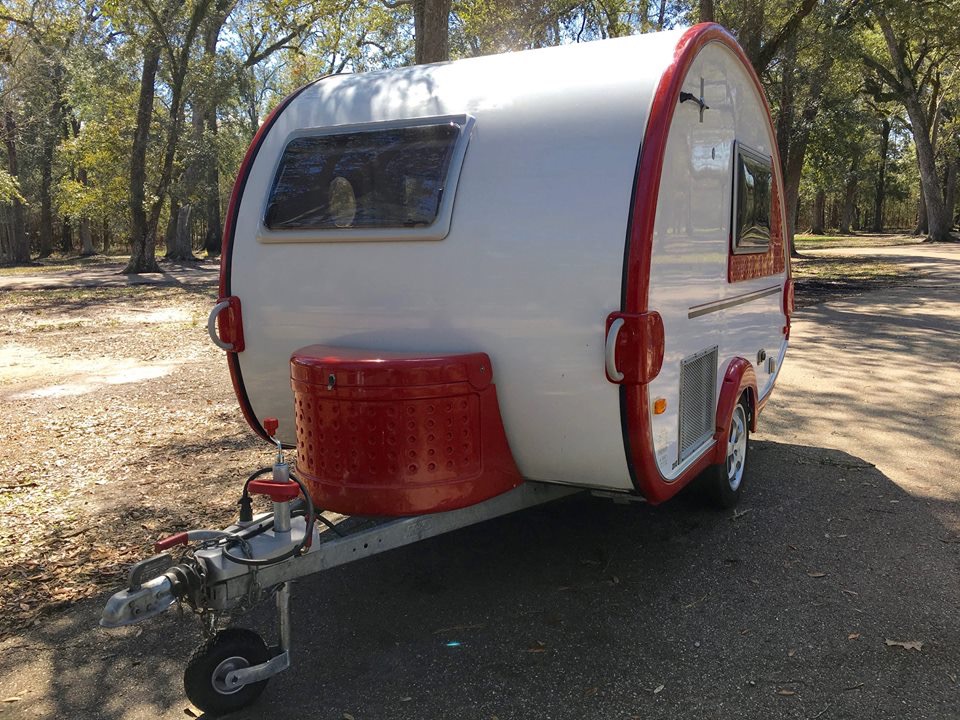
Did I ever tell you about the time The Tiny’s jockey wheel fell down while I was going 60 mph on a 24-mile-long overwater bridge with no shoulder to pull over on?
It happened just a few days ago when I was coming home from my second ever outing with The Tiny. The campout was fantastic! It was two days with my friend and her kiddos (on their first every campout!) and two days with myself, trying to determine if I can do writing work while camping. Yes! I can!
Driving home was only a 35-minute journey, with the vast majority of it over the longest overwater bridge in the world, and it was nerve-wracking. I was doing what I call “10-2 driving,” which means I have my left hand on the wheel at the 10 o’clock position, and my right hand on the 2 o’clock position. No cell phone. No messing around.
At some point, my dog wanted to poke her head out passenger side rear window to get some air, so I let it down a bit. It was then that I heard a strange sound from the T@B reverberating against the concrete curb of the bridge. I thought: “Has that noise always been there?” I thought not.
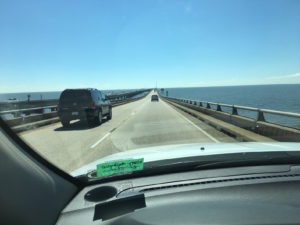
With fast-moving vehicles to the side of me, ahead of me and behind me, it would be impossible to stop in the lane and check it out. I had 9 miles to go to land and so I slowed a little, but proceeded. When I could, I stopped, got out, and surveyed the situation.
I have to pause here and say that prior to Dec. 22, 2016, when I took possession of the 2007 T@B trailer, I had never heard the term “jockey wheel,” and suddenly I had one.
The jockey wheel is attached to the jack on the tongue of the trailer frame. The tongue is the part in the front where you hitch it up to a vehicle. The tip of the tongue is the “coupler,” another term I was not familiar with, and that goes over the ball attached to your vehicle with a hitch.
When the trailer is not hooked up to the ball and hitch on your vehicle, you need some way to keep the tongue from slamming down to the ground. That is why there is a jack attached. You can crank the jack up and down to raise and lower the tongue on and off the ball. When it’s resting or being stored, the weight of tongue is on the jockey wheel, if you have one, or resting on a foot at the bottom of the jack, or on some stacks of 4-by-4s, or a cinder block, or some jack stands. It’s your choice. My trailer happens to have a wheel at the bottom of the jack, and that wheel allows you to move the lightweight trailer around by hand. Is that not fun?
I’m explaining all this like you are a seriously compromised individual just so you understand the level of unknowningness with which I arrived at this T@B trailer experience. I came equipped with pure, unadulterated, unrelenting ignorance. To me, all of this is breaking news. I come to it with desire, and little more. I’m not apologizing for this, or accepting judgement or snarky comments. After decades of asking my brother or uncle or father or boyfriend or husband or neighbor’s second cousin to do things for me, this is the state I am in. That’s all changing now.
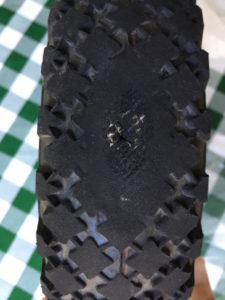
Pulling over on a neighborhood street, I saw that the jockey wheel, which should been raised and secured while I was driving home, had fallen down to street level, been dragged there a few miles, and the tire was now ruined. This was a special pneumatic jockey tire that I had paid to purchase, and paid to have installed, just a few weeks prior.
It was easy enough to jiggle the wheel back to where it should have been, and tighten it down for the few miles left for me to get home, and think about what just happened.
I recalled back at the campsite when I was hitching up. I had a little piece of paper in my hand with a list of tasks to complete to make towing safe.
I had printed it from a T@B owners’ forum. Someone had gone to all the trouble to make this little guide, and I was grateful as I read off each item and completed the task.
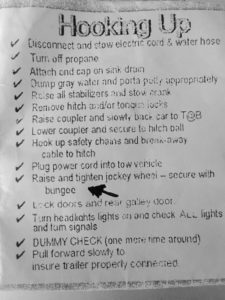
I came to the line item that said “Raise and tighten jockey wheel – secure with bungee.”
That made sense. I had watched a video by a vintage T@B expert named Richard Lewis who talked about the jockey wheel and how the handle that tightens it could loosen while traveling and allow the wheel to fall. There are several strategies he suggested to keep that from happening, and I certainly planned to execute those soon. Richard is also the author of the book titled: “101 Questions About T@b, T@da, and T@g Camping Trailers: Making Modifications and Troubleshooting Problems on These Great Little Trailers!” You can buy a Kindle version on Amazon.
But for many owners of this vintage of T@B trailer, the bungee strategy to secure the jockey wheel is tried and true. My problem was that my vehicle was already packed and I could not easily find the plastic bag where I had neatly stored my bungee cords. I knew it was in a big basket, but not where. I have not reached the point in travels with The Tiny where I know where stuff is. That time will come, but isn’t here yet.
I had some cord handy, though, and I could have tied the wheel with that. But I had what now seems like a ridiculous thought: “The cord would look goofy and not cool.” I had fresh memories of the days past when I tried to tie up my dog using rope so she couldn’t chase wild boars infiltrating the campground, and my knots kept unraveling. I know I suck at knot tying.
So think about that. The idea that someone passing me on the highway might look over and see the cord and know that I don’t know squat about tying knots was more important to me than my life, the trailer’s life, and the life of all those following me on the highway that might be impacted by a jockey wheel malfunction. It’s truly frightening to realize that’s how I think sometimes.
I do not have an affinity for the physical world. I’m not “mechanical.” I don’t know how things work. Even gravity can be a surprise. My desire to own and use a T@B trailer is butting up hard against my absolute stupidity about such things.

I’m in the process of getting a new tire. That required me to figure out how to rest the tongue of the trailer on something to get the tire off. Of course that took many discussions on FB and forums and much pondering and some driving and purchasing. Then I had to figure out how to get the wheel off. That required texts and watching videos and using my new needle nose pliers for the first time. And of course it’s a European tire (excuse me, tyre) because the jack came from Germany. So that requires some EBay action. Everything’s a big ordeal for me. I’m perfect with grammar and punctuation. But all this? Not so much.
Once I get the jockey wheel fixed, I will certainly be putting into place those strategies that will prevent it and the new tire from EVER falling again.
The bad news is that when it comes to the physical world as it relates to my T@B, I do just about everything wrong the first time.
The good news is that none of it has (so far) been fatal to the T@B or me.
And the very best news is that I only seem to need to make each mistake once.
The next day, I drove to Costco for groceries and as I walked across the parking lot, I felt a swagger in my body I’d never felt before. Was it my Tony Lama cowboy boots? My slim turquoise jeans that match the color of my hair? There was a force there that was different. I felt taller and self-contained, as though none of my energy was draining off, getting sucked out of me, or otherwise vanishing. I felt absolutely badass.
Somehow, all of this is connected.
